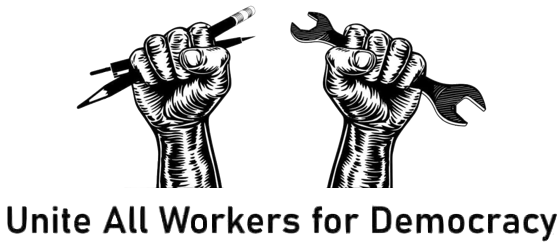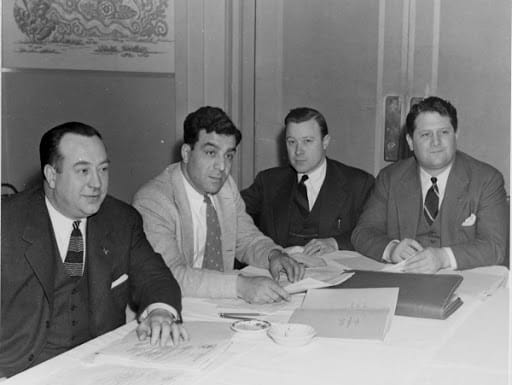For over seventy years, the UAW has been under the complete control of a one-party state. That party — the Administration Caucus — was initially formed by UAW icon and long-time President Walter Reuther and his supporters during the early political factional battles within the union.
After years of infighting between these factions to decide who would lead the burgeoning union, Reuther became convinced that any sort of compromise between them would be impossible. After narrowly winning the UAW presidency in 1946, Reuther was adamant that he would accept “nothing less than the elimination of his rivals from all posts in the UAW hierarchy.” (The Most Dangerous Man in Detroit, Nelson Lichtenstein, p. 261)
Reuther and the Administration Caucus were finally able to purge all remaining significant rivals when Reuther was re-elected as President in 1947 and his last remaining opponents were voted off of the International Executive Board — most notably long-time secretary treasurer George Addes.
No longer with any real opposition to challenge its power at the International level, the Administration Caucus was able to fill appointed jobs with Caucus loyalists. There was also a concerted effort on the part of the Caucus to help loyalists win important elections at Local unions as well — especially those Locals that stood in opposition to Reuther.
In author Roger Keeran’s book “The Communist Party and the Auto Workers’ Union,” Keeran details how the Administration Caucus consolidated its power over the UAW.
“Immediately after his sweep of the 1947 convention, Reuther purged all Communists, Communist sympathizers, and other leftists from the International staff… Using the power of a sympathetic Executive Board and a subservient staff, Reuther moved quickly and ruthlessly against left-wing leaders of local unions.”
According to Keeran (p. 285), “Ford Local 600, the last bastion of Communist and left-wing influence in the UAW, remained a thorn in Ruether’s side for many years.” Although it took considerable time for the Caucus to unseat the leadership there, it was eventually successful in doing so.
The Administration Caucus’ complete takeover of the UAW allowed for Reuther to move forward with his unique vision for the union. Without the constant infighting between factions, there was now a unified agenda, and under Reuther’s leadership, the union was able to win unprecedented wage increases, benefits, and workplace improvements for the rank-and-file during his tenure as President.
Cost of living allowances, pensions, and supplemental unemployment benefits were all won at the bargaining table during Reuther’s time at the helm of the UAW.
Author John Barnard, in his book American Vanguard, explained; “The real wages and living standards of auto workers (under Reuther’s leadership) rose dramatically. Measured in constant dollars, the 1947 average weekly wage in the industry of $56.51 had doubled by 1960 to $115.21, and tripled by 1970 to $170.07.” (p. 260)
However, there were considerable long-term downsides to the Caucus’ consolidation of power.
The direction of the union was now at the whim of a single political party within the UAW. With the entire Executive Board, Internationally appointed officers, and most important officers at big Locals now loyalists to the Caucus, democracy was largely eradicated from the union. Said General Gordon Baker, a co-founder of the Dodge Revolutionary Union Movement (DRUM) and vocal critic of the Administration Caucus, “The Reuther machine didn’t allow any dissent. You could hardly run for a Local office without being tied to the Reuther Caucus.”* (Brothers on the Line Documentary)
Even Reuther himself admitted to the lack of internal democracy within the UAW in regards to elections of International leadership. “I have always said one should encourage enough opposition to make it interesting but not enough to make it dangerous,” he once wrote.* (Brothers on the Line documentary)
As the union became more bureaucratized and top-down in it’s power structure under the leadership of Reuther, shop floor militancy began to wane, as – unlike the left-wing elements of the union’s earlier years — the Caucus was adamantly opposed to militant action. Wildcat strikes were denounced by International leadership, and at times, leadership went to extraordinary lengths to control rank-and-file militancy.
Perhaps the most detrimental aspect to this bureaucratization of the union was contained in the landmark 1950 five-year contract agreement between the UAW and General Motors — most commonly referred to as “the Treaty of Detroit.
While the contract was groundbreaking and the catalyst for an ever-increasing standard of living for autoworkers, GM was more than satisfied to pay the good wages and benefits contained in the agreement because the union had finally conceded on its desire to challenge management’s prerogatives regarding production decisions.
“The Treaty of Detroit signaled the end of the era in which Reuther — as the boldest spirit in the leadership of the industrial union movement — could hope for a serious transformation in the governing structure of American industry. Writing for Fortune, Daniel Bell, once himself a comrade of Reuther’s in the Socialist Party, summed up the meaning of the contract: GM may have paid a billion for peace but it got a bargain. General Motors has regained control over one of the crucial management functions… long range scheduling of production, model changes, and tool and plant investment.” (TMDMID, p. 280)
In American Vanguard, Barnard describes how the Administration Caucus — despite its shortcomings — was able to achieve success due to Reuther’s unique talents as a labor statesman: “Reuther’s continuing success as president was a more important part of the explanation for the failure of strong oppositional groups to emerge than the use of internal manipulations and constraints. He was a shrewd politician, opportunistic and flexible, and very agile politically. Obtaining superior contracts, the union’s primary purpose in the view of most members, sealed the Reuther group’s hold on power.”(p. 254-255)
However, after Reuther’s unfortunate passing in a plane crash on May 9, 1970, there was no one within the Caucus who could have filled the gigantic void he had left behind. Yet, the Administration Caucus remained in complete and total control of the UAW.
Justin Mayhugh is the co-chair of UAWD, as well as Guide at UAW Local 31

